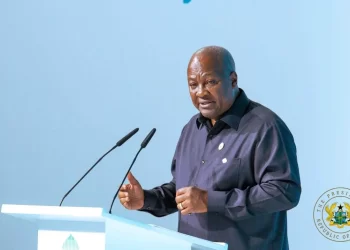Ghana raked in $370.78 million in oil revenue in the first half of 2025, according to the Bank of Ghana’s latest semi-annual report on petroleum receipts.
The inflows, spanning January to June, reflect income from crude oil sales, corporate taxes paid by oil companies, surface rentals, and investment earnings.
Despite the healthy receipts, concerns loom over the country’s shrinking crude oil production, which has now declined for the fifth consecutive year.
Jubilee, SGN fields drive lifting revenue
Crude oil liftings accounted for the bulk of the revenue, contributing $218.63 million.
Two liftings from the Jubilee field yielded $144.20 million, while the Sankofa Gye Nyame (SGN) field added $74.43 million through a single lifting.
The remaining revenue came from corporate taxes, which generated $148.75 million.
Tullow Ghana Limited and ENI Ghana Exploration and Production Limited were the largest corporate tax contributors in the period under review.
Other income sources included $863,045.81 from surface rentals and $2.38 million in interest earnings from the Petroleum Holding Fund (PHF).
Petroleum funds receive allocations
As mandated by the Petroleum Revenue Management Act, a portion of the revenue has been allocated to Ghana’s long-term savings and stabilisation accounts.
The Ghana Petroleum Fund received a total of $63.53 million.
Out of this, $44.47 million was transferred to the Ghana Stabilisation Fund, which cushions the budget in times of revenue shortfalls, while the Ghana Heritage Fund—intended for future generations—received $19.06 million.
Crude production declines for the fifth straight year
While the first-half revenue figure appears robust, the long-term outlook for Ghana’s upstream petroleum sector is less promising. The 2024 Annual Report by the Public Interest and Accountability Committee (PIAC) reveals that crude oil production fell to 48.25 million barrels in 2024, down from 71.44 million barrels in 2019.
This marks the fifth consecutive year of declining output, with a marginal year-on-year drop of 0.01% in 2024 and an average annual decline of 7.4% since the 2019 peak.
Energy analysts warn that if this trend continues, it could significantly undermine the country’s fiscal stability and its capacity to finance critical national development programmes, especially in the face of growing reliance on oil income.
Questions over sector sustainability
The persistent fall in output has triggered concerns about the sustainability of Ghana’s upstream petroleum sector.
Industry observers cite ageing oil fields, delayed new projects, and regulatory bottlenecks as key challenges facing the sector.
Calls have intensified for accelerated investment in exploration and production, coupled with stronger regulatory reforms, to reverse the downward trend and safeguard the country’s petroleum wealth.
In the face of the global energy transition and mounting pressure to reduce reliance on fossil fuels, Ghana’s oil sector finds itself at a crossroads—needing bold policy interventions and strategic partnerships to unlock its full potential.
For now, though, the mid-year revenue performance offers a measure of fiscal relief, even as questions linger about the future trajectory of the country’s petroleum industry.













